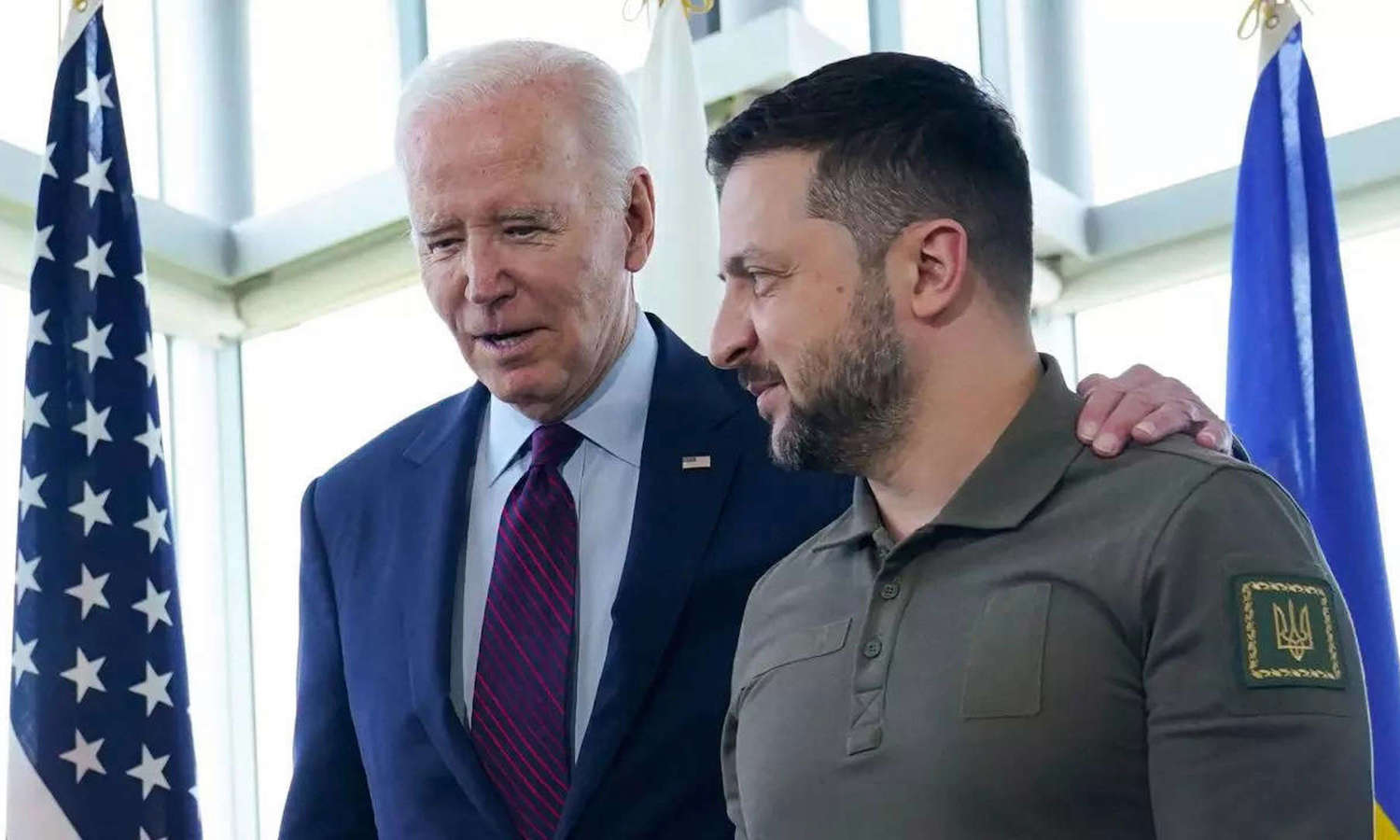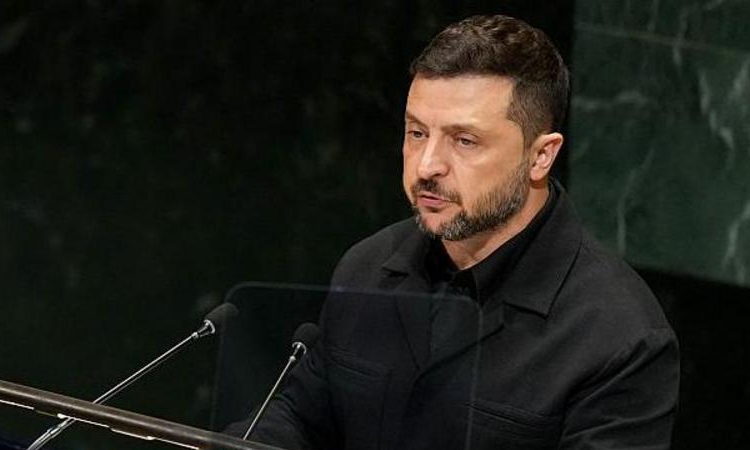As USA announces support ‘cannot be indefinite’, several east European states are also looking for a way out.
The collapse of Kiev’s much trailed ‘counteroffensive’ and the parallel collapse of all the related windbaggery about ‘standing with Ukraine until the end’ is leaving the collective west with a stinking hangover.
Fools on the Hill
Nowhere is this more evident than with the fools on Capitol Hill in Washington, where both Republicans and Democrats still keep up the pretence that they will “stand by Ukraine for as long as it takes” whilst in reality they are both possessed of a fervent wish to wash their hands of the whole affair and find the exit, leaving Europe to sort out the mess.
This contradiction, which cannot be sustained for long, is currently being played out on the floor of the US Congress, as the representatives chew over the budget requirements that need to be agreed for 2024.
This is never an edifying affair at the best of times, as rival political factions vie to settle old scores, feather nests and promote vanity projects, not scrupling to hold up ratification of the whole budget to accommodate this or that amendment.
This is a dangerous game to play, and some years the deadline is breached, leading to the actual breakdown of public services, as pay to public servants and teachers is withheld. What usually happens to break the deadlock is that some compromise form of words is finessed, allowing social life to resume.
But these are not the best of times for US imperialism, which is losing its proxy war against Russia, losing its influence in the world, and right now confronting the outbreak of an audacious revolutionary war in occupied Palestine.
What in happier times might be passed over as a storm in a constitutional teacup may not be so easily smoothed over now that Uncle Sam is on the ropes.
On this occasion, what happened was that the Republican party, increasingly fed up by President Joe Biden’s willingness to go on chucking money into Kiev’s money pit with nothing to show for it, and eager to call for money instead to fund tax cuts and tackle Mexican immigration, challenged the government’s resort to a so-called “omnibus” bill, which, as well as doing normal things like paying teachers and civil servants, would also encompass the provision of billions of dollars in ‘aid’ for Ukraine.
Seeing this as a kind of smuggling exercise, the Republicans not only shot it down but went on to oust Kevin McCarthy, the Republican house speaker who had helped to craft this now aborted compromise budget and who was rumoured to have concluded a side deal with Biden behind the back of his own party.
Under the US constitution, the budget bill cannot be launched without the election of a new speaker. Meanwhile, the clock is ticking towards the 30 November deadline for ratification of the national budget.
With Ukraine’s ‘counteroffensive’ dying on its feet and stooge actor-president Volodymyr Zelensky’s whining for more scraps from the imperial table falling on ever deafer ears, it is becoming clearer by the day that the USA is now moving to disengage from the war. Neither party in Congress can seriously contend otherwise.
But so far from this tacit common ground enabling a bipartisan approach to planning the end game, the reality is that, reeling from a humiliating defeat in the proxy war, both parties are plunged into chaotic mutual recrimination, with Republicans accusing Democrats of trying to sneak through inflated military aid appropriations and Democrats accusing Republicans of sabotaging efforts to reach agreement on government spending levels in time to avoid a national shut-down of public services.
There are further tensions coming out from within each party too, as when pro-Trump Republicans engineered the ouster of his fellow Republican, Kevin McCarthy.
Defeat in Ukraine, chaos in Washington, revolution in Palestine – US security council spokesman John Kirby got it about right: the USA is running out of rope.
“Kirby said the support provided to Ukraine, currently at war with Russia, is not going to be indefinite. He added that the USA is running out of money for Ukraine unless Congress approves additional funding.
“‘In the near term, we’ve got appropriations and authorities for both Ukraine and for Israel,’ Kirby said during the daily press briefing. ‘But you don’t want to be trying to bake in long-term support when you’re at the end of the rope.
“‘And in Ukraine, on the Ukraine funding, we’re coming near to the end of the rope,’ he added. ‘Today we announced $200 million, and we’ll keep that aid going as long as we can, but it’s not going to be indefinite.’” (Support to Ukraine not ‘indefinite’: US after announcing $200m aid by Priya Pareek, Times Now News India, 12 October 2023)
Never a truer word.
Slovak elections offer no comfort to Kiev
Whilst western European states are still cowed into submission by US imperialism, even as they watch their economies collapsing about their ears, there are signs that some of Ukraine’s nearer neighbours are chafing at the bit as they suffer the blowback from the anti-Russian sanctions campaign and the growing threat of being drawn into a widening war.
Earlier Slovak governments have in the past urged tougher sanctions against Russia and donated large quantities of weaponry to the fascists in Kiev. But as the Ukrainian ‘counteroffensive’ hits a brick wall and Slovakia, a member of both the European Union and Nato, held elections at the end of September, Věra Jourová, the European Commission’s top digital affairs official, was so worried that the vote might not go well for the west’s chosen party, the liberal PS, that she stated in advance that the vote would be a “test case” to see how effective social media companies would be in countering Russian propaganda.
She presumably worked on the circular argument that if PS did well, then Russian propaganda would have failed, whilst if the PS did badly, why then this must mean that the dastardly Russian disinformation had done its work. The possibility that the electorate might just take it into its head to cast its vote where it chose to do, without requiring external interference from anywhere, seems not even to have entered Věra Věra Jourová’s head, such is the arrogance of the imperialist mindset.
Doubtless to her fury, the elections were in fact won by a left-wing populist leader, Robert Fico, whose Smer party secured 22.9 percent of the vote. His campaign slogan was straightforward: “Not one bullet more”, calling for an immediate halt to arms deliveries to the fascists in Ukraine.
The west-oriented liberal PS party was left trailing at 17.9 percent and the Hlas party (originating as a centrist split from Smer) secured 14.7 percent.
Fico has now formed a coalition government with PS and Hlas. He is damning about the role of Ukrainian neo-nazis in the war and denounces military cooperation with the USA as a betrayal of Slovak national interests. He has denounced the suggestion that Ukraine should become a member of Nato.
Nor is he alone in seeing Russia in a positive light. In a 2020 survey, 78 percent of his compatriots said they saw Russia as Slovakia’s traditional Slavic sister nation. Approval ratings dipped a little in the immediate aftermath of the launch of the special military operation, but in May this year another survey revealed that support for continuing with Nato membership had sunk to 58 percent.
Further, a full 50 percent of respondents blamed the USA for endangering regional security and 69 percent feared that by supporting the Kiev junta, the Slovak government risked dragging the country into war. Unsurprisingly, the highest level of support for Kiev and Nato was in Bratislava, a wealthy region in the west, whilst the warmest assessment of Russia was to be found in the more working-class eastern areas suffering high levels of unemployment.
In Hungary too, the EU has its work cut out trying to persuade Prime Minister Viktor Orban to lift his veto on an urgently required aid package for Kiev. With a left-populist prime minister in Slovakia working in tandem with the Hungarian president, the west could find it difficult to rely on its friends in the east.
Even more worrying for them is the open contempt with which Poland’s President Duda recently dismissed his erstwhile allies, describing Ukraine as a drowning man struggling to drag down everyone else, and refusing to send any more weaponry.
When the dust settles from the 15 October election, it is possible that a weakening of prime minister Mateusz Morawiecki’s parliamentary base may make it difficult for his Freedom and Justice party to form a government, but whether Warsaw will return to the generosity shown toward its troublesome neighbour before the collapse of the illusory ‘counteroffensive’ is yet to be seen.
Bulgaria’s President Rumen Radov summed up the impatience with Kiev shared by many of his neighbours when he grumbled: “Ukraine insists on fighting this war but the bill is paid by the whole of Europe.”
It was the United States that instigated the proxy war against Russia. It was the United States that bullied and cajoled Europeans into supporting it. But now that the wheels have come off the whole enterprise, the United States is turning around and saying to Europe: this is your war, deal with it.
Whilst the gutless countries of western Europe may continue to turn the other cheek, some of Ukraine’s eastern neighbours could prove to be an admirably weak link in the chain.
















